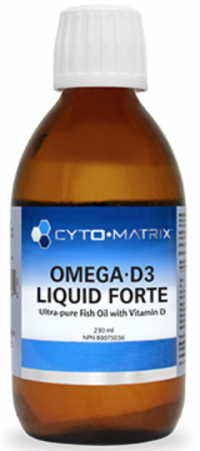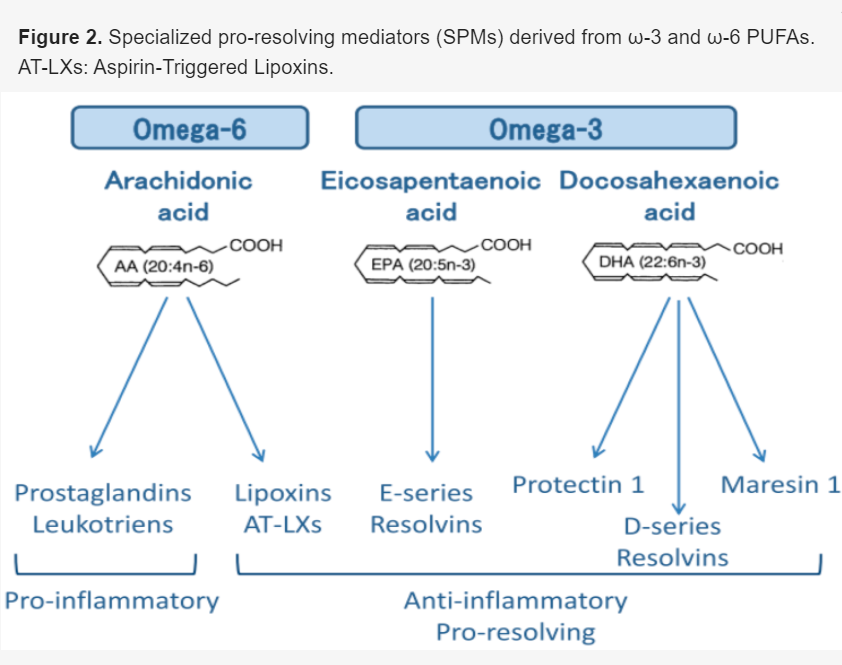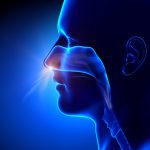Everyone has likely heard of the link between omega-3 oils and our health. You may have heard that they are important for your brain, heart and reducing inflammation and that you probably are not getting enough in our standard diet. So I have decided to take a deep dive and unpack what the current research is telling us.
Fish oil contains omega-3 fatty acids, which are part of a healthy diet that is associated with lower levels of inflammation. Your body can’t manufacture omega-3 fatty acids—eicosapentaenoic acid (EPA), docosahexaenoic acid (DHA), and alpha-linolenic acid (ALA)—so it’s important to get them through the food you eat or the supplements you take.
EPA and DHA are primarily found in fatty fish, such as salmon, sardines and fish rowe. ALA is found in plants and is available in nuts and seeds. EPA is generally regarded as the anti-inflammatory fatty acid and heart health, while DHA is more responsible for neurodevelopment (don’t forget our baby’s brains) and nerve/brain protection (preventing Alzheimer’s,dementia, etc.).
The modern diet has seen a drastic reduction in the intake of omega-3 fatty acids. This is compounded by a significantly greater intake of omega-6 fatty acids via vegetable oils in the processed modern diet. This is problematic as many of our tissues rely on fatty acids for proper synthesis and communication. If the appropriate fatty acids are not available the implications for overall health are serious. Ultimately, a relative deficiency of omega-3 fatty acids can lead to a pro-inflammatory state and increase the risk of chronic disease.
EPA and DHA have been clinically studied in a variety of health conditions. Supplementation with these omega-3 fatty acids have been found to be beneficial for cardiovascular health, rheumatoid arthritis, autoimmunity, cognition, brain health, depression and skin health. Simply put, EPA and DHA should be considered for addressing any systemic inflammatory condition.
If you are supplementing make sure it is molecularly distilled, ensuring purity and removal of harmful compounds such as heavy metals and organophosphates. Also, light, air and temperature make oils rancid so a dark glass bottle is preferred and the oils should have vitamin E to protect against and prevent oxidation. Look for the IFOS or the `international fish oil standard certification, as they are an independent Canadian company that tests fish oils. 
This is the one I use and recommend here. Rosemary extract and mixed tocopherols are added to the formula and every bottle is capped with nitrogen, all to protect against and prevent oxidation (avoiding the fishy rancid taste and burps that are negatively correlated with fish oil).
It seems to notably reduce the symptoms of depression and improve some painful, inflammatory conditions.
The fatty acids EPA and DHA are involved in regulating various biological processes such as the inflammatory response, various metabolic signaling pathways, and brain function. They can be synthesized in the body from alpha-linolenic acid (ALA), but in small amounts for most people.
Omega 3 fatty acids make up the most important tissues in our bodies- every membrane of every cell is made up of fatty acids. All cells are different and have different needs and flexibility affected by fatty acids.
Omega–3 fatty acids seem to prevent or attenuate experimental arthritis. They may have a beneficial effect in the treatment of rheumatoid arthritis. Clinical studies have shown that omega–3 fatty acids may have a modulatory effect on disease activity, namely on the number of swollen and tender joints.
EPA
Known as the heart healthy component through multiple avenues by being into converted to metabolites (prostoglandin-type molecules) making blood platelets less likely to be sticky, similar to taking aspirin without some of the side effects. EPA also able to produce a series of molecules called resolvins. Because they ‘resolve’ inflammation and have an anti-inflammatory effect. EPA is incorporated into cell membranes affecting their structure and fluidity, making cellular metabolism run more smoothly. Big study with EPA only free of DHA (REDUCE-IT, vascEPA) 4 grams per day ethyl ester which is the typical supplementation. Among patients with elevated triglyceride levels despite the use of statins, the risk of ischemic events, including cardiovascular death, was significantly lower among those who received 2 g of icosapent ethyl twice daily than among those who received placebo.https://www.nejm.org/doi/full/10.1056/nejmoa1812792
Image below from: Omega-3 Polyunsaturated Fatty Acids for the Treatment of IgA Nephropathy

Cardiovascular benefits of EPA/DHA per Bill Harris, Ph.D, expert in omega-3 fatty acids, is also in the average population as well. EPA will shut down some inflammatory process and may be improving. Heart rate variability or (HRV) can also be improved with EPA supplementation.
DHA
Similar to EPA instead of resolivins, DHA also have protectans metabolites very active in anti- inflammatory processes (https://www.sciencedirect.com/science/article/abs/pii/S1098882312000202 ) and will improve platelet function making them less sticky, similar to EPA but through a different process. DHA is likely better at lowering triglycerides and raising HDL than EPA. Some individuals may have a slight increase in LDL but it is unclear of the impact. Testing can be done through an omega 3 index (EPA + DHA in red blood cells) target is 8-12% thought of a healthy range (average population is around 4-5%). There seems to be some genetic variability. Studies have not shown adverse effects with as much as 5-6 grams of combined EPA/DHA supplementation. (Peter Attia, The Drive Podcast: Qualy #236 and #83 Bill Harris, Ph.D)
A ‘high dose of fish oil (4g/day) lowered triglyceride levels by 20-30% in people with high triglycerides according to an analysis of 17 randomized controlled trials reviewed by the scientific advisory council at the American Heart Association.https://www.sciencedaily.com/releases/2019/08/190819082438.htm
Rhonda Patrick recommends DHA predominantly from marine sources; fatty fish, fish row (eggs, caviar), krill oil and high quality clean fish oil supplementation.
She recommends DHA supplementation especially for brain health. The integrity of blood brain barrier (BBB) as we age this becomes compromised and worse with people with APOE4 allele. APOE4 status can be attained via genetic testing such as 23andme and others.
Having 1 APOE4 copy, you are 2-fold more likely to get Alzheimers, amounts to 25% of the population. Having 2 copies of APOE4, is much less common but increase 10-15 fold!
Concussions or traumatic brain injury (TBI) may be negative if you have APOE4 status. APOE4 status may be a consideration when putting children into contact sports for this reason.
(APOE4 allele linked with impairment of deep sleep and deadly sleep apnea | Rhonda Patrick and Matthew Walker short video)
APOE4 disrupts tight junctions of BBB. DHA supplementation may very important in this population as it provides a second way to transport phospholipid form transported by active transport as it flips from outer to inner and bypasses this defect in tight junctions. This may also be a nice way to bypass defects of ‘normal’ brain age and we know that when there is a lack of DHA in the brain, we are more likely to have dementia.
‘Type 3 diabetes” is a term that has been proposed to describe the hypothesis that Alzheimer’s disease, which is a major cause of dementia, is triggered by a type of insulin resistance and insulin-like growth factor dysfunction that occurs specifically in the brain. DHA may be able to improve glucose transporters across BBB.
ALA
This plant-based omega-3 is found in green, leafy vegetables; flaxseeds and chia seeds; and canola, walnut and soybean oils (although those rancid oils are not ones I generally recommend). ALA is known as a short-chain omega-3. This means your body has to convert it into longer-chained EPA and DHA to synthesize it. This process is rather inefficient, and only about one percent of the ALA you consume is converted to the long-chain version your body needs (although this percentage is slightly higher for women). As per Dr. Axe here.
A nice update of the literature on omega-3 by Rhonda Patrick here. Also, a fairly technical podcast with Peter Attia and Bill Harris here.
How much omega-3 is enough?
Most organization agree that at least two servings of a 3.5-ounce serving of fish (preferably oily) each week is a good start. That equals about 500 milligrams of EPA/DHA each day. For treating disease, up to 4,000 milligrams per day is recommended by various studies.
The percentages listed below are based on a 4,000 milligrams (four grams)/day guideline. The foods highest in dietary omega-3 fats include fatty fish, certain nuts and sees, and more.
- Atlantic Mackerel: 6,982 milligrams in 1 cup cooked (174 precent DV)
- Salmon Fish Oil: 4,767 milligrams in 1 tablespoon (119 percent DV)
- Cod Liver Oil: 2.664 milligrams in 1 tablespoon (66 percent DV)
- Walnuts: 2,664 milligrams in 1/4 cup (66 percent DV)
- Chia Seeds: 2,457 milligrams in 1 tablespoon (61 percent DV)
- Herring: 1,885 milligrams in 3 ounces (47 percent DV)
- Alaskan Salmon (wild-caught): 1,716 milligrams in 3 ounces (42 percent DV)
- Flaxseeds (ground): 1,597 milligrams in 1 tablespoon (39 percent DV)
- Albacore Tuna: 1,414 milligrams in 3 ounces (35 percent DV)
- White Fish: 1,363 milligrams in 3 ounces (34 percent DV)
- Sardines: 1,363 milligrams in 1 can/3.75 ounces (34 percent DV)
- Hemp Seeds: 1,000 milligrams in 1 tablespoon (25 percent DV)
- Anchovies: 951 milligrams in 1 can/2 ounces (23 percent DV)
- Natto: 428 milligrams in 1/4 cup (10 percent DV)
- Egg Yolks: 240 milligrams in 1/2 cup (6 percent DV)
(Thanks to Dr. Axe for this list of food containing omega-3 fats seen above)
Other links:
Biology of breast milk and breastfeeding. (as well as the importance of omega-3 oils for baby’s health and brain development).













Thank you for the information! I always appreciate how you and your team always goes above and beyond just chiropractor treatments by sharing information and advice on the latest research into health, wellness, fitness and longevity! Thanks again!